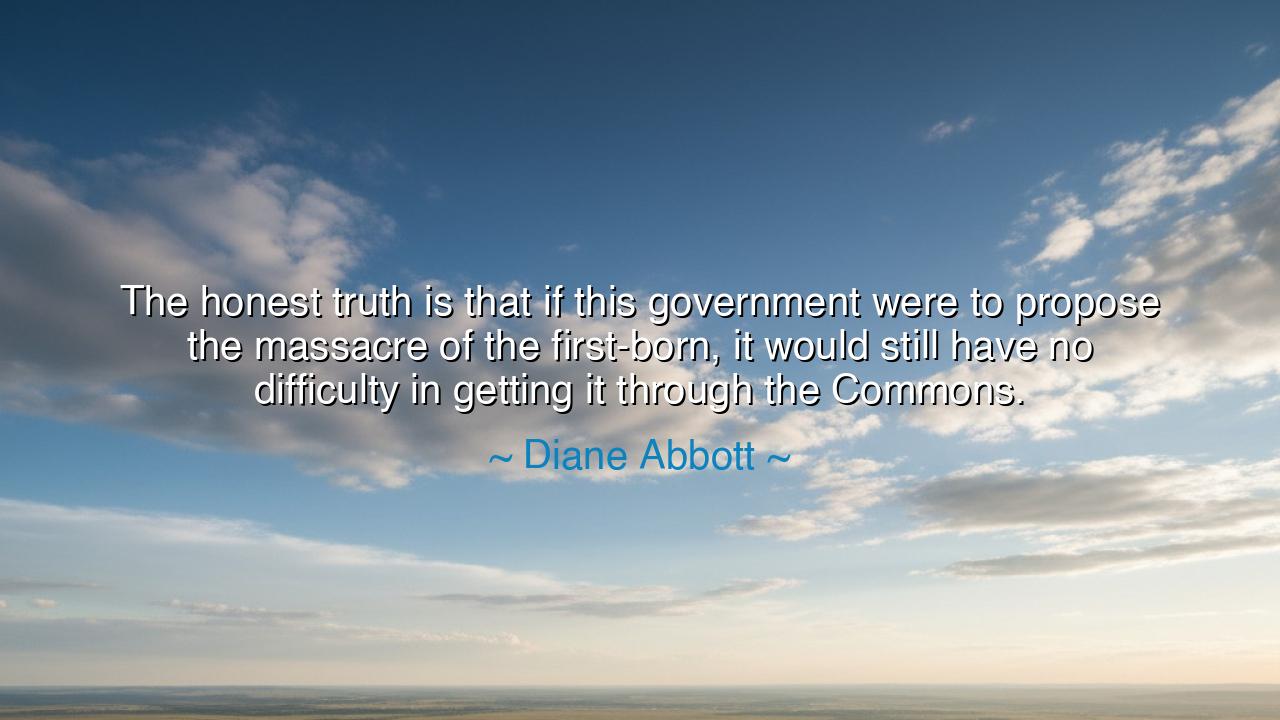
The honest truth is that if this government were to propose the
The honest truth is that if this government were to propose the massacre of the first-born, it would still have no difficulty in getting it through the Commons.






When Diane Abbott, one of Britain’s most outspoken parliamentarians, declared, “The honest truth is that if this government were to propose the massacre of the first-born, it would still have no difficulty in getting it through the Commons,” she did not speak literally of slaughter, but figuratively of obedience without conscience. Her words, like the lament of an ancient prophet, expose a deep sickness that can befall any nation — when those entrusted to govern cease to question, and when those chosen to represent the people surrender their judgment for the sake of party and power. It is a cry against complacency, a warning that blind loyalty in politics is as dangerous as tyranny itself.
The meaning of this quote lies in its bitter irony. Abbott paints an extreme image — the massacre of the first-born — to reveal how easily moral boundaries can be crossed when lawmakers abandon courage for convenience. It is not the act itself that she fears, but the spirit of submission that allows such acts to pass unopposed. Her words echo through history: from the Roman Senate that cheered Caesar’s ambition, to parliaments that justified war and oppression in the name of “necessity.” In every age, the same peril arises — when institutions built to protect the people become echo chambers of authority, when dissent is treated as betrayal, and when the voice of conscience is drowned beneath the roar of conformity.
The origin of Abbott’s remark can be traced to her frustration with the British political system — particularly the tendency of Members of Parliament to vote along party lines rather than by principle. In her time, as in many before it, she saw that the House of Commons, once the arena of spirited debate and moral conviction, had grown timid, docile, and too easily persuaded by the government of the day. Her statement was not merely satire; it was an act of moral protest. Like the ancient satirists of Rome, she wielded exaggeration as a sword — to cut through hypocrisy and awaken the sleeping conscience of her peers.
To understand the truth of her warning, one need only look to history’s darkest hours. In Germany during the 1930s, the Reichstag became an instrument of destruction — every atrocity sanctioned by law, every cruelty justified by procedure. The massacre of the innocent did not begin with weapons, but with obedient votes. Bureaucrats followed orders; legislators approved measures they dared not oppose; silence became complicity. The world learned, too late, that the gravest crimes of history are often committed not by monsters, but by ordinary men who lacked the courage to say “no.” Abbott’s hyperbole, then, becomes prophetic — for she reminds us that even the most civilized governments can descend into moral chaos when power is unchallenged.
Her quote also unveils a deeper truth about human nature — that men and women, desiring safety, prestige, or belonging, will often surrender judgment to the crowd. In politics, this is the death of integrity. A parliament that fears its leaders more than it fears injustice has already lost its soul. The ancient Greeks knew this danger well. In Athens, when Socrates stood before his accusers, they too chose obedience over truth, expedience over wisdom. The result was not just the death of one man, but the corruption of a people’s conscience. The same fate awaits any government that confuses loyalty to power with loyalty to principle.
The lesson in Abbott’s words is clear and timeless: never allow authority to go unexamined. A nation’s strength does not lie in how smoothly its rulers command, but in how bravely its citizens — and its representatives — question. True patriotism is not servility, but vigilant dissent. A democracy that silences the voice of conscience will one day awaken to find it has become the very tyranny it once opposed. The first-born of liberty — truth, justice, and moral courage — will have been sacrificed on the altar of obedience.
And so, my children, take heed. When you see wrong cloaked in legality, speak. When you witness cruelty disguised as policy, resist. Let your loyalty be not to parties or leaders, but to truth and humanity. For every generation faces the same temptation — to choose comfort over conscience, order over righteousness. Yet the health of a free society depends upon those who will stand, even alone, and say: “This is not right.” In that defiance lies the only hope that the massacre of the innocent, whether in body or in spirit, shall never again pass unchallenged through the halls of power.






AAdministratorAdministrator
Welcome, honored guests. Please leave a comment, we will respond soon